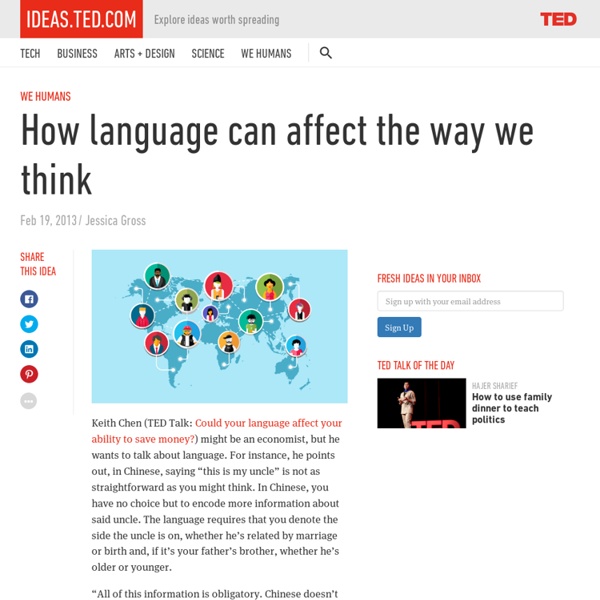Mouth clicks used in human echolocation captured in unprecedented detail
Like some bats and marine mammals, people can develop expert echolocation skills, in which they produce a clicking sound with their mouths and listen to the reflected sound waves to "see" their surroundings. A new study published in PLOS Computational Biology provides the first in-depth analysis of the mouth clicks used in human echolocation. The research, performed by Lore Thaler of Durham University, U.K., Galen Reich and Michael Antoniou of Birmingham University, U.K., and colleagues, focuses on three blind adults who have been expertly trained in echolocation. Since the age of 15 or younger, all three have used echolocation in their daily lives.
50 Questions To Help Students Think About What They Think click 2x
contributed by Lisa Chesser Using the right questions creates powerful, sometimes multiple answers and discussions. Aristotle said that he asked questions in response to other people’s views, while Socrates focused on disciplined questioning to get to the truth of the matter. Ultimately questions spark imagination, conjure emotions, and create more questions. The questions asked by a teacher or professor are sometimes more glaringly valuable than the information transferred to the students. Those questions spark a thought, which leads to a fiercely independent search for information.
Kill the Password: Why a String of Characters Can't Protect Us Anymore
You have a secret that can ruin your life. It’s not a well-kept secret, either. Just a simple string of characters—maybe six of them if you’re careless, 16 if you’re cautious—that can reveal everything about you. Your email. Your bank account. Your address and credit card number.
Zero
Historical scientists categorize the types of number systems peoples use, much the same way philologists break down languages into "analytic," "agglutinative," "inflectional," etc. The path that leads to the discovery of "0" lies only in the most advanced type of number system, which is called "positional" because the value of a character depends on its position. Our modern way of counting is positional. The base figure "5" has a different value in 514 and in 145, determined by its position. The Romans, Greeks, Hebrews (and Aztecs and pre-Islamic Arabs and a great many others) used an "additive" system, which is fundamentally a transcription of counting.
My Shoes
This EFL lesson plan is designed around a short film called My Shoes by Nima Raoofi, and the themes of envy and empathy. Students write a story, watch a short film, talk about empathy and envy, discuss comments on a YouTube video , and practise idiomatic expressions. Language level: Intermediate (B1) – Upper Intermediate (B2) Learner type: Teens and adults
How we discovered three poisonous books in our university library
Some may remember the deadly book of Aristotle that plays a vital part in the plot of Umberto Eco’s 1980 novel The Name of the Rose. Poisoned by a mad Benedictine monk, the book wreaks havoc in a 14th-century Italian monastery, killing all readers who happen to lick their fingers when turning the toxic pages. Could something like this happen in reality? Poisoning by books? Our recent research indicates so. We found that three rare books on various historical topics in the University of Southern Denmark’s library collection contain large concentrations of arsenic on their covers.
How to improve your Critical Thinking skills: Interview with Dr. Gerald Nosich – Life Lessons
In this article I interview an expert on Critical Thinking, Dr. Gerald Nosich from the Foundation for Critical Thinking, who has been teaching Critical Thinking since 1977 to find out how we can improve our Critical Thinking skills. In this article you will learn: Let’s start at the beginning…
Why English as the Universal Language of Science Is a Problem for Research
Technology The vast majority of scientific papers today are published in English. What gets lost when other languages get left out?
Kanji of the year, meaning 'disaster,' symbolizes 2018 amid natural and human calamities
KYOTO – The kanji sai (災, disaster) was picked as the Chinese character best describing this year’s social mood in Japan, amid a string of natural and man-made calamities, a Kyoto-based kanji promotion organization announced Wednesday. Chief Buddhist priest Seihan Mori of the Kiyomizu Temple in Kyoto wrote the character 1.5 meters in length and 1.3 meters in width with a giant calligraphy brush on traditional washi paper at the temple’s annual year-end event, where the kanji of the year was revealed. The selection came after Japan was buffeted this year by torrential rains in the country’s west and an large earthquake in Hokkaido, heightening public awareness of the importance of disaster prevention measures. Japan was also rocked by man-made calamities such as stolen cryptocurrencies and the uncovering of harassment by coaches in the athletic world. The selection of the word was based on characters put forward by the general public.
25 Helpful Websites for Creative Writers
Jun 08, 2011 Need help getting your creative juices flowing? These websites for creative writers offer grammar tips, writing prompts, peer critiques and advice on getting published. Read on to learn how you can strengthen your creative writing on the Web. General Writing



